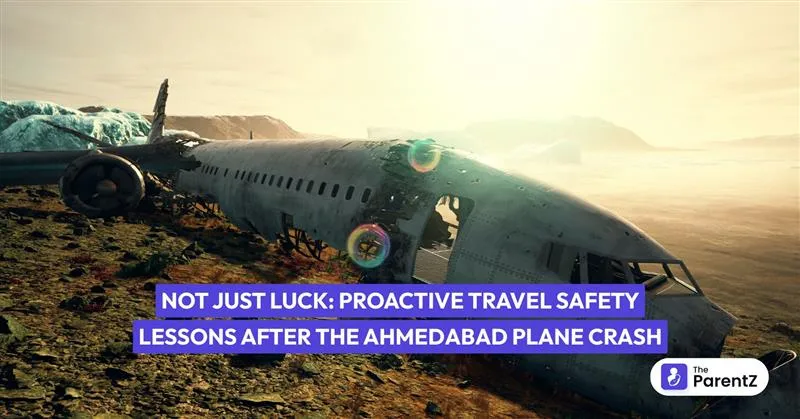The news of the Air India Flight 171 crash in Ahmedabad has left a deep mark on all of us. It is hard to even imagine the pain of the families who lost their loved ones, both on the plane and on the ground. The tragedy reminds us that life is unpredictable, and sometimes, even the safest journeys can turn into nightmares. But it also teaches us that travel safety is not just about luck. There are things we can do—simple, practical steps—that can make a difference. As parents, as travelers, and as people who care, we owe it to ourselves and our children to be prepared, not just hopeful.
Remembering the Tragedy
On June 12, 2025, Air India Flight 171 took off from Ahmedabad, heading to London. It was a modern Boeing 787 Dreamliner, a plane known for its advanced technology and safety features. But just 36 seconds after takeoff, the plane lost power and crashed into the hostel buildings of B.J. Medical College. Out of 242 people on board, only one survived. The crash also killed at least 39 people on the ground and injured many more. The survivor, a 40-year-old British citizen, managed to escape only because he was seated next to an emergency exit and acted quickly when he saw a way out.
This was not just a failure of luck. It was a harsh lesson that even when everything seems right, things can go wrong. But it is also a reminder: there are steps we can take to give ourselves and our families the best chance in an emergency.
Basic Air Travel Safety Lessons for Parents and Families
1. Always Buckle Up
The only survivor of the crash said he was able to get out because he had his seat belt on, and he managed to unbuckle and escape when the opportunity came. Seat belts are not just for takeoff and landing. Keep them fastened whenever you are seated. Teach your children why it matters.
2. Know Your Exits
Before every flight, pay attention to the safety demonstration. Count the rows to the nearest exit from your seat. Show your children where the exits are. In an emergency, smoke or panic can make it hard to see. Knowing the way out can save precious seconds.
3. Choose Seats Wisely
If possible, try to book seats near the exits. The survivor of Flight 171 was sitting in an exit row, which made a difference when the crash happened. While no seat is guaranteed to be safe, being near an exit can help in some situations.
4. Use Approved Car Seats for Young Children
For babies and toddlers, always use an FAA-approved car seat on the plane. Do not rely on holding your child in your lap. It is safer for them and for you. Make sure the seat is installed correctly and that your child is buckled in properly.
5. Keep Calm and Teach Calm
Children look to adults in emergencies. Practice simple safety routines with your kids: how to listen to instructions, how to stay calm, and how to follow you quickly if something happens. Remind them not to panic and to trust you and the crew.
6. Avoid Blocking Aisles and Exits
Keep bags, toys, and other items stowed away. In an emergency, you do not want anything blocking your way or tripping you or your children.
7. Listen to Crew Instructions
Flight attendants are trained for emergencies. Teach your children to listen and follow their instructions, no matter what.
8. Hygiene and Health Precautions
Travel exposes families to germs and illnesses. Carry hand sanitizer and wipes. Wash hands before eating. If your child is sick or has special health needs, talk to your doctor before flying.
9. Prepare for Ear Pain
Give babies a bottle or pacifier during takeoff and landing. Older children can chew gum or sip water. This helps with ear pressure changes.
10. Stay Together
In airports and on planes, always keep your children close. Teach them what to do if you get separated—find a uniformed staff member and wait in a safe place.
Personal Lessons from the Ahmedabad Crash
This tragedy highlights the importance of being proactive about safety. Trust in technology and the airline is important, but personal responsibility matters too. Simple habits like fastening seat belts, knowing the exits, and listening to instructions can make a real difference. Parents should use every flight as an opportunity to teach children about safety, not to frighten them, but to prepare them.
Honoring the Lives Lost
The people who died in the Ahmedabad crash were just like us—families, children, students, doctors, travelers. Their dreams ended too soon. The best way we can honor them is by learning from what happened and making sure we do everything we can to keep ourselves and our loved ones safe.
Travel is a gift, but safety is a responsibility. Let us not leave it to luck. Let us be proactive, prepared, and always a little more careful. For our children, for ourselves, and for those who can no longer travel with us.





Be the first one to comment on this story.